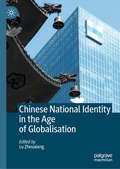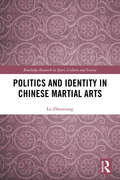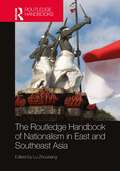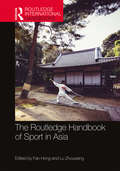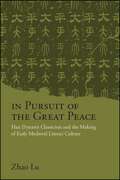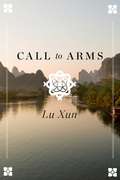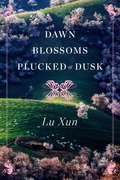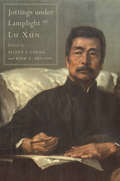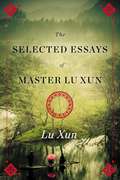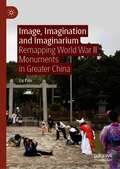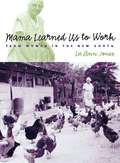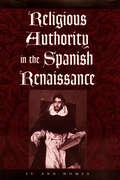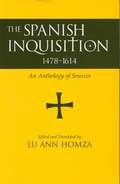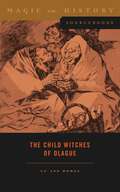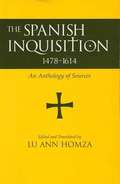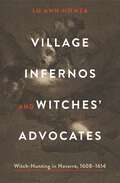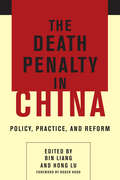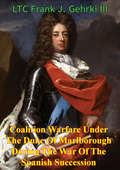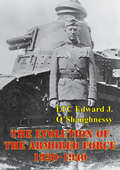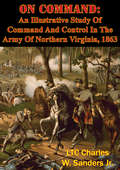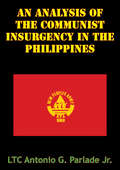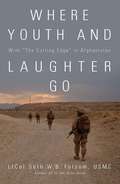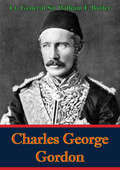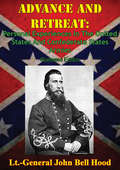- Table View
- List View
Chinese National Identity in the Age of Globalisation
by Lu ZhouxiangWritten by a team of international scholars from China, Germany, Ireland, New Zealand and the UK, this book provides interdisciplinary studies on the construction and transformation of Chinese national identity in the age of globalisation. It addresses a wide range of issues central to national identity in the context of Chinese culture, politics, economy and society, and explores a diverse set of topics including the formation of an embryonic form of national identity in the late Qing era, the influence of popular culture on national identity, globalisation and national identity, the interaction and discourse between ethnic identity and national identity, and identity construction among overseas Chinese. It highlights the latest developments in the field and offers a distinctive contribution to our knowledge and understanding of national identity.
Politics and Identity in Chinese Martial Arts (Routledge Research in Sport, Culture and Society)
by Lu ZhouxiangChinese martial arts is considered by many to symbolise the strength of the Chinese and their pride in their history, and has long been regarded as an important element of Chinese culture and national identity. Politics and Identity in Chinese Martial Arts comprehensively examines the development of Chinese martial arts in the context of history and politics, and highlights its role in nation building and identity construction over the past two centuries. This book explores how the development of Chinese martial arts was influenced by the ruling regimes’ political and military policies, as well as the social and economic environment. It also discusses the transformation of Chinese martial arts into its modern form as a competitive sport, a sport for all and a performing art, considering the effect of the rapid transformation of Chinese society in the 20th century and the influence of Western sports. The text concludes by examining the current prominence of Chinese martial arts on a global scale and the bright future of the sport as a unique cultural icon and national symbol of China in an era of globalisation. Politics and Identity in Chinese Martial Arts is important reading for researchers, students and scholars working in the areas of Chinese studies, Chinese history, political science and sports studies. It is also a valuable read for anyone with a special interest in Chinese martial arts.
The Routledge Handbook of Nationalism in East and Southeast Asia
by Lu ZhouxiangThis handbook presents a comprehensive survey of the formation and transformation of nationalism in 15 East and Southeast Asian countries. Written by a team of international scholars from different backgrounds and disciplines, this volume offers new perspectives on studying Asian history, society, culture, and politics, and provides readers with a unique lens through which to better contextualise and understand the relationships between countries within East and Southeast Asia, and between Asia and the world. It highlights the latest developments in the field and contributes to our knowledge and understanding of nationalism and nation building. Comprehensive and clearly written, this book examines a diverse set of topics that include theoretical considerations on nationalism and internationalism; the formation of nationalism and national identity in the colonial and postcolonial eras; the relationships between traditional culture, religion, ethnicity, education, gender, technology, sport, and nationalism; the influence of popular culture on nationalism; and politics, policy, and national identity. It illustrates how nationalism helped to draw the borders between the nations of East and Southeast Asia, and how it is re-emerging in the twenty-first century to shape the region and the world into the future. The Routledge Handbook of Nationalism in East and Southeast Asia is essential reading for those interested in and studying Asian history, Social and Cultural history, and modern history.
The Routledge Handbook of Sport in Asia (Routledge International Handbooks)
by Fan Hong Lu ZhouxiangThis is the first book to offer a comprehensive overview of the history, development and contemporary significance of sport in Asia. It addresses a wide range of issues central to sport in the context of Asian culture, politics, economy and society. The book explores diverse topics, including the history of traditional Asian sport; the rise of modern sport in Asia; the Olympic Movement in Asia; mega sport events in Asia; sport governance and policy; gender, class and ethnicity in Asian sport, and Asia’s sporting heroes and heroines. With contributions from 74 leading international scholars, it offers a new perspective on understanding Asian sport and society, telling the story of how sport in this mega-region is coming together and reshaping the world in the process. It also provides readers with a wide lens through which to better contextualise the relationships between Asia and the world within the global sport community. The Routledge Handbook of Sport in Asia is a vital resource for students and scholars studying the history, politics, sociology, culture and policy of sport in Asia, as well as sport management, sport history, sport sociology, and sport policy and politics. It is also valuable reading for those working in international sport organisations.
In Pursuit of the Great Peace: Han Dynasty Classicism and the Making of Early Medieval Literati Culture (SUNY series in Chinese Philosophy and Culture)
by Lu ZhaoThrough an examination of the Great Peace (taiping), one of the first utopian visions in Chinese history, Zhao Lu describes the transformation of literati culture that occurred during the Han Dynasty. Driven by anxiety over losing the mandate of Heaven, the imperial court encouraged classicism in order to establish the Great Peace and follow Heaven's will. But instead of treating the literati as puppets of competing and imagined lineages, Zhao uses sociological methods to reconstruct their daily lives and to show how they created their own thought by adopting, modifying, and opposing the work of their contemporaries and predecessors. The literati who served as bureaucrats in the first century BCE gradually became classicists who depended on social networking as they traveled to study the classics. By the second century CE, classicism had dissolved in this traveling culture and the literati began to expand the corpus of knowledge beyond the accepted canon. Thus, far from being static, classicism in Han China was full of innovation, and ultimately gave birth to both literary writing and religious Daoism.
Call to Arms (Echoes Of Classics Ser.)
by Lu XunCall to Arms is a collection of revolutionary Chinese writer Lu Xun’s most famous and most important short stories. Featuring “A Madman’s Diary,” a scathing attack of traditional Confucian civilization and “The True Story of Ah Q,” a poignant satire about the hypocrisy of Chinese national character and the first work written entirely in the Chinese vernacular. Together this collection exposes a contradictory legacy of cosmopolitan independence, polemical fractiousness, and anxious patriotism that continues to resonate in Chinese intellectual life today.
Dawn Blossoms Plucked at Dusk (Echoes Of Classics Ser.)
by Lu XunA collection of essays by Lu Xun, one of the most influential figures of modern Chinese literature. In this classic and beautiful collection, Lu Xun recounts the stories of his childhood and youth in Shaoxing, China. A revolutionary thinker and writer, and one of the architects of the May 4th Movement, his stories reveal the beauty, joy, and struggle of life in early twentieth-century China.
Jottings under Lamplight
by Lu XunLu Xun (1881–1936) is widely considered the greatest writer of twentieth-century China. Although primarily known for his two slim volumes of short fiction, he was a prolific, inventive essayist. These 62 essays—20 translated for the first time—showcase his versatility as a master of prose forms and his brilliance as a cultural critic.
Selected Essays of Master Lu Xun
by Lu XunThe Selected Essays of Master Lu Xun collects together his most influential and powerful essays and lectures. Critical of traditional Chinese culture, of the superstition and rigid social mores, and passionate in his argument for reform, his essays from the classic contemplation on Confusion patriarchy "What Is Required of Us as Fathers Today," to his critique of Chinese identity politics "My Mustache" are exemplary of Chinese thought, society, and politics in a transitional historic period.
Image, Imagination and Imaginarium: Remapping World War II Monuments in Greater China
by Lu PanThis book explores five cases of monument and public commemorative space related to World War II (WWII) in contemporary China (Mainland), Hong Kong and Taiwan, all of which were built either prior to or right after the end of the War and their physical existence still remains. Through the study on the monuments, the project illustrates past and ongoing controversies and contestations over Chinese nation, sovereignty, modernism and identity. Despite their historical affinities, the three societies in question, namely, Mainland China, Hong Kong and Taiwan, vary in their own ways of telling, remembering and forgetting WWII. These divergences are not only rooted in their different political circumstances and social experiences, but also in their current competitions, confrontations and integrations. This book will be of great interest to historians, sinologists and analysts of new Asian nationalism.
Mama Learned Us to Work
by Lu Ann JonesFarm women of the twentieth-century South have been portrayed as oppressed, worn out, and isolated. Lu Ann Jones tells quite a different story in Mama Learned Us to Work. Building upon evocative oral histories, she encourages us to understand these women as consumers, producers, and agents of economic and cultural change.As consumers, farm women bargained with peddlers at their backdoors. A key business for many farm women was the "butter and egg trade--small-scale dairying and raising chickens. Their earnings provided a crucial margin of economic safety for many families during the 1920s and 1930s and offered women some independence from their men folks. These innovative women showed that poultry production paid off and laid the foundation for the agribusiness poultry industry that emerged after World War II. Jones also examines the relationships between farm women and home demonstration agents and the effect of government-sponsored rural reform. She discusses the professional culture that developed among white agents as they reconciled new and old ideas about women's roles and shows that black agents, despite prejudice, linked their clients to valuable government resources and gave new meanings to traditions of self-help, mutual aid, and racial uplift.
Religious Authority in the Spanish Renaissance (The Johns Hopkins University Studies in Historical and Political Science #118)
by Lu Ann HomzaIn Religious Authority in the Spanish Renaissance, Lu Ann Homza rejects the traditional view of the Spanish Renaissance as a battle of strict opposites in favor of a more nuanced history. Through analyses of Inquisition trials, biblical translations, treatises on witchcraft, and tracts on the episcopate and penance, Homza illuminates the intellectual autonomy and energy of Spain's ecclesiastics, exploring the flexibility and inconsistency in their preferences for humanism or scholasticism, preferences which have long been thought to be steadfast.
Spanish Inquisition, 1478-1614: An Anthology of Sources
by Lu Ann HomzaThis collection of previously untranslated court documents, testimonials, and letters portrays the Spanish Inquisition in vivid detail, offering fresh perspectives on such topics as the Inquisition's persecution of Jews and Muslims, the role of women in Spanish religious culture, the Inquisition's construction and persecution of witchcraft, daily life inside an Inquisition prison, and the relationship between the Inquisition and the Spanish monarchy. Headnotes introduce the selections, and a general introduction provides historical, political, and legal context. A map and index are included.
The Child Witches of Olague (Magic in History Sourcebooks)
by Lu Ann HomzaIn the early seventeenth century, thousands of children in Spain’s Navarre region claimed to have been bewitched. The Child Witches of Olague features the legal depositions of self-described child witches as well as their parents and victims. The volume sheds new light on Navarre’s massive witch persecution (1608–14), illuminating the tragic cost of witch hunts and opening a new window onto our understanding of early modern Iberian life. Drawing from Spanish-language sources only recently discovered, Homza translates and annotates three court cases from Olague in 1611 and 1612. Two were defamation trials involving the slur “witch,” and the third was a petition for divorce filed by an accused witch and wife. These cases give readers rare access to the voices of illiterate children in the early modern period. They also speak to the emotions of witch-hunting, with testimony about enraged, terrified parents turning to vigilante justice against neighbors. Together the cases highlight gender norms of the time, the profound honor code of early modern Navarre, and the power of children to alter adult lives. With translations of Inquisition correspondence and printed pamphlets added for context, The Child Witches of Olague offers a portrait of witch-hunting as a horrific, contagious process that fractured communities. This riveting, one-of-a-kind book will appeal to anyone interested in the history of witch hunts, life in early modern Spain, and history as revealed through court testimony.
The Spanish Inquisition, 1478-1614: An Anthology Of Sources
by Lu Ann HomzaThis collection of previously untranslated court documents, testimonials, and letters portrays the Spanish Inquisition in vivid detail, offering fresh perspectives on such topics as the Inquisition's persecution of Jews and Muslims, the role of women in Spanish religious culture, the Inquisition's construction and persecution of witchcraft, daily life inside an Inquisition prison, and the relationship between the Inquisition and the Spanish monarchy. Headnotes introduce the selections, and a general introduction provides historical, political, and legal context. A map and index are included.
Village Infernos and Witches’ Advocates: Witch-Hunting in Navarre, 1608–1614 (Iberian Encounter and Exchange, 475–1755 #5)
by Lu Ann HomzaThis book revises what we thought we knew about one of the most famous witch hunts in European history. Between 1608 and 1614, thousands of witchcraft accusations were leveled against men, women, and children in the northern Spanish kingdom of Navarre. The Inquisition intervened quickly but incompetently, and the denunciations continued to accelerate. As the phenomenon spread, children began to play a crucial role. Not only were they reportedly victims of the witches’ harmful magic, but hundreds of them also insisted that witches were taking them to the Devil’s gatherings against their will. Presenting important archival discoveries, Lu Ann Homza restores the perspectives of illiterate, Basque-speaking individuals to the history of this shocking event and demonstrates what could happen when the Spanish Inquisition tried to take charge of a liminal space. Because the Spanish Inquisition was the body putting those accused of witchcraft on trial, modern scholars have depended upon Inquisition sources for their research. Homza’s groundbreaking book combines new readings of the Inquisitional evidence with fresh archival finds from non-Inquisitional sources, including local secular and religious courts, and from notarial and census records. Expanding our understanding of this witch hunt as well as the history of children, community norms, and legal expertise in early modern Europe, Village Infernos and Witches’ Advocates is required reading for students and scholars of the Spanish Inquisition and the history of witchcraft in early modern Europe.
Village Infernos and Witches’ Advocates: Witch-Hunting in Navarre, 1608–1614 (Iberian Encounter and Exchange, 475–1755)
by Lu Ann HomzaThis book revises what we thought we knew about one of the most famous witch hunts in European history. Between 1608 and 1614, thousands of witchcraft accusations were leveled against men, women, and children in the northern Spanish kingdom of Navarre. The Inquisition intervened quickly but incompetently, and the denunciations continued to accelerate. As the phenomenon spread, children began to play a crucial role. Not only were they reportedly victims of the witches’ harmful magic, but hundreds of them also insisted that witches were taking them to the Devil’s gatherings against their will. Presenting important archival discoveries, Lu Ann Homza restores the perspectives of illiterate, Basque-speaking individuals to the history of this shocking event and demonstrates what could happen when the Spanish Inquisition tried to take charge of a liminal space. Because the Spanish Inquisition was the body putting those accused of witchcraft on trial, modern scholars have depended upon Inquisition sources for their research. Homza’s groundbreaking book combines new readings of the Inquisitional evidence with fresh archival finds from non-Inquisitional sources, including local secular and religious courts, and from notarial and census records. Expanding our understanding of this witch hunt as well as the history of children, community norms, and legal expertise in early modern Europe, Village Infernos and Witches’ Advocates is required reading for students and scholars of the Spanish Inquisition and the history of witchcraft in early modern Europe.
The Death Penalty in China: Policy, Practice, and Reform
by Lu Liang Bin HongFeaturing experts from Europe, Australia, Japan, China, and the United States, this collection of essays follows changes in the theory and policy of China's death penalty from the Mao era (1949–1979) through the Deng era (1980–1997) up to the present day. Using empirical data, such as capital offender and offense profiles, temporal and regional variations in capital punishment, and the impact of social media on public opinion and reform, contributors relay both the character of China's death penalty practices and the incremental changes that indicate reform. They then compare the Chinese experience to other countries throughout Asia and the world, showing how change can be implemented even within a non-democratic and rigid political system, but also the dangers of promoting policies that society may not be ready to embrace.
Coalition Warfare Under The Duke Of Marlborough During The War Of The Spanish Succession
by Ltc Frank J. Gehrki IIICoalition warfare is an important area of military study for today. During the War of the Spanish Succession, the Duke of Marlborough successfully led a coalition of over twenty nations and states against the armies of Louis XIV of France. During the war, he waged ten campaigns applying military brilliance to defeat French military pre-eminence on the continent. His victories propelled England to a position of power in Europe. He achieved his many successes despite being crippled by the myriad problems incumbent in coalition warfare. This study examines Marlborough's prosecution of the War of the Spanish Succession, focusing on the aspects of coalition warfare. It examines how the Duke of Marlborough dealt with the challenges presented by his coalition partners. It concludes with potential lessons for those who might wage coalition warfare today.
The Evolution Of The Armored Force, 1920-1940
by Ltc Edward J. O’shaughnessy Jr.In armored force circles the inter-war years are sometimes referred to as the "lean years." The abolishment of the separate Tank Corps in 1920, the Depression Era budget constraints and a lack of national strategic vision have caused a mistaken belief that little attention was paid to the development of armored force structure and doctrine in this critical time period. In fact the evidence points to the contrary. Rather than development by a kick start in 1940, the evidence illustrates an evolution of armored doctrine and force structure. The process started immediately upon return from World War I by a core of tank visionaries and advocates. The fruits of their labors were realized in 1940 when war demanded the rapid fielding of armored divisions. The fact that fourteen divisions were fielded in four years, when none had existed previously, is testimony to their efforts. This paper is told from their perspective. In the face of significant institutional obstacles these tank advocates responded to a higher calling. The inter-war period has parallels for us today. Once again we have declared victory, are downsizing our force structure and slashing our defense budget. Will we retain and encourage within our ranks visionaries and advocates to prepare our military for future conflict as we enter a new "lean years" era?
On Command: An Illustrative Study Of Command And Control In The Army Of Northern Virginia, 1863
by Ltc Charles W. Sanders Jr.A key element in the practice of operational art is the command and control senior leaders employ to direct their forces in battle. This command and control encompasses not only the vision the commander has for the attainment of his campaign aims, but how he translates that vision and his intent into orders which lead to the securing of his objectives. Should the commander fail to impart his vision or intent to his subordinates the unity of effort of his forces will suffer as each subordinate will be left to determine for himself which actions on the battlefield are key to the success of the campaign. This, in large measure, was the case in the army of Northern Virginia in 1863, and the result was defeat on the battlefield.
An Analysis Of The Communist Insurgency In The Philippines
by Ltc Antonio G. Parlade Jr.The Maoist-inspired Communist Party of the Philippines celebrated its 37th anniversary on December 2005. It marks a long history of violence, terror, and instability in the archipelagic country of 87 million people, causing thousands of casualties among government troops, insurgents, and including civilians. This study seeks to find a lasting solution that will finally bring to a close the final chapter to insurgency in the country. It was approached from a historical point of view by studying the events that lead to the birth of the movement in 1932 until its defeat in 1954. A new chapter of the Maoist insurgency started in 1969 and this movement emerged into a formidable guerrilla force that became the primary threat to the nation's security. This paper tries to analyze how that insurgency persisted to challenge the government this far and what went wrong with the government's response. It will attempt to answer the primary question: How to defeat the communist insurgency?
Where Youth and Laughter Go
by LtCol Seth W. B. FolsomWhere Youth and Laughter Go: With "The Cutting Edge” in Afghanistan completes LtCol Seth Folsom’s recounting of his personal experiences in command over a decade of war. It is the culminating chapter of a trilogy that began with The Highway War: A Marine Company Commander in Iraq in 2006 and continued with In the Gray Area: A Marine Advisor Team at War in 2010. The chronicle of Folsom’s command of 3rd Battalion, 7th Marine Regiment, "The Cutting Edge,” and his harrowing deployment to Afghanistan’s volatile Sangin District presents a deeper look into the complexities and perils of modern counterinsurgency operations in America’s longest war. Charged with the daunting task of pacifying a region with a long history of violence and instability, Folsom and his Marines struggled daily to wage a dynamic campaign against the shadowy enemy force that held Sangin’s population firmly in its grip. With peace and stability always teetering on the brink of collapse, the Marines of "The Cutting Edge” confronted their own mortality as they conducted endless patrols through Sangin’s minefields while fighting to win the hearts and minds of the Afghan villagers. No other books have been published from the perspective of a Marine infantry battalion commander in Afghanistan. It was Folsom’s job, as the unit commander, to lead his Marines under impossible circumstances. LtCol Folsom made the unusual decision to patrol with his rifle squads every day through Sangin, where his Marines dodged improvised explosive devices and sniper fire from an invisible enemy. As his tour progressed and casualties mounted, he found his objectivity evaporating and the love for his men growing. Where Youth and Laughter Go is more than a blood-and-guts war story, it is a jarring, "boots on the ground”-level examination of the myriad challenges and personal dilemmas that today’s young service members face as the United States approaches its final endgame in Afghanistan.
Charles George Gordon
by Lt.-General Sir William F. ButlerMajor-General Charles George Gordon, was known under many titles, Gordon Pasha, Chinese Gordon and Gordon of Khartoum; all of which stem from his long and distinguished service around the world in the British Army. In this biography, Lt.-General Butler charts Gordon's progress through the phases of his career with an expert attention to detail.Gordon saw his first active service in the merciless bloodbath of the Crimean war in which he distinguished himself and learnt many lessons on how not to conduct military operations. His military reputation gained further laurels in China, where he commanded the "Ever Victorious Army" during the Taiping rebellion to great success. His enduring fame, however, remains for his conduct in Egypt and the Sudan; he led the valiant garrison in the besieged city of Khartoum against the self-proclaimed Mahdi in 1884. He and the defenders gallantly held on for a year, gaining much public attention, but there was no relief force at hand and Gordon and as many as 10,000 inhabitants were brutally slaughtered. Gordon and his heroic stand at Khartoum are still remembered today and he still stands immortalized in many statues around the countries of the former British Empire.An excellent and well written biography.
Advance And Retreat: Personal Experiences In The United States And Confederate States Armies [Illustrated Edition]
by Lt.-General John Bell HoodIncludes Civil War Map and Illustrations Pack - 224 battle plans, campaign maps and detailed analyses of actions spanning the entire period of hostilities."When John Bell Hood entered into the services of the Confederate Army, he was 29 years old, a handsome man and courageous soldier, loyal to the ideal of Confederate Independence and eager to fight for it. He led his men bravely into the battles of Second Manassas, Gaines's Mill, Sharpsburg, Fredericksburg, Gettysburg, and Chickamauga. He rose fast, attaining the temporary rank of full general, only to fall faster. Hood emerged from the war with his left arm shattered and useless, his right leg missing, his face aged far beyond his 33 years, and with his military reputation in disgrace. Blamed by contemporaries for contributing to the defeat of his beloved Confederacy, Hood struggled to refute their accusations. His most vehement critic, General Johnston, charged Hood with insubordination while serving under him and, after succeeding him in command, of recklessly leading Confederate troops to their "slaughter" and "useless butchery." Sherman, too, in his Memoirs, took a harsh view of Hood. Born of controversy, Advance and Retreat is of course a highly controversial book. It is also full of invaluable information and insights into the retreat from Dalton in early 1864, the fighting around Atlanta, and the disastrous Tennessee Campaign in winter of that year. Far from being a careful, sober, objective account, this book is the passionate, bitter attempt of a soldier to rebut history's judgment of himself as general and man."-Print ed.
